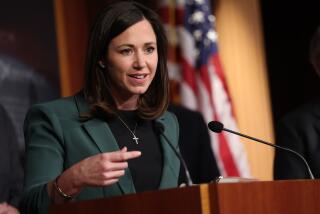Analysis: Trump’s early missteps threaten impressions of presidential competence

President Trump’s go-it-alone strategy has put at risk a core quality that must be projected by any successful American commander-in-chief: competence.
The botched weekend rollout of a refugee and travel ban was reminiscent of President Obama’s stumbling introduction of his healthcare website and President George W. Bush’s tortured response to Hurricane Katrina.
Both cut sharply into each man’s ability to be seen as a capable steward of the presidency. Bush’s popularity never recovered from his administration’s mishandling of the Gulf Coast’s hurricane recovery; Obama regained ground, but the healthcare program continued to be a rallying cry for his opponents.
Trump’s stumble over his first week could end up as an asterisk in his presidency, an ungainly beginning that prompted improvements. But it underscored several difficulties that lie ahead.
First is the danger of defying the normal niceties of Washington. Consulting and gaining feedback from more experienced hands, including those on Capitol Hill and the administration’s own departments, could have smoothed out problems privately and prepared agencies to implement and defend the new travel policy.
Instead, the order banning travel from seven Muslim-majority countries was tightly held among the president’s top political aides, coming as a surprise even to the agencies tasked with running it. On Monday, acting Atty. Gen. Sally Yates, a holdover from the Obama administration, said she would not defend the travel order and questioned its legality, leading Trump to immediately fire her.
The second is how Trump’s inflammatory campaign rhetoric continues to define him, overriding his new administration’s efforts to cast his presidency in more positive ways. The Trump administration worked all weekend to counter assertions that his plan represented a ban on Muslims, a job made more difficult by his regular assertions during the campaign that he planned to enact one.
Ignoring the sharp divisions in the land, Trump again focused on pushing a policy that is popular with his own voters but that breeds suspicion among those who did not support him, furthering cementing the nation’s political divide.
“There’s some issues where everyone cheers for competence and some issues where half the country cheers for incompetence because they oppose the policy,” UC San Diego political scientist Thad Kousser said.
The lasting damage of an incident like this, he said, is that it can “erode a president’s political capital,” particularly with his own party.
“The fact is that we are already seeing some clear criticism from his own party with the way he rolled this out,” he said.
Trump and his staff did nothing publicly to stem that sort of criticism; indeed, they returned it. As has been the practice since the beginning of his campaign, no regrets were voiced despite a weekend that saw nationwide protests of the surprise entry ban.
As a candidate, Trump could simply ignore the tumult and roll on to the next event. As a president he was left hanging, his only strong defense coming from the small coterie of aides who helped create the mess.
It did not help that even on Monday the rationale for including specific countries in the plan was fuzzy. Trump spokesman Sean Spicer cited as rationales past terrorist attacks in Boston and San Bernardino as well as on Sept. 11, 2001. But the culprits in those attacks would not have been included in the order signed by Trump on Friday evening because they came from elsewhere.
Spicer also cited the attack on Muslims in Quebec as evidence of the need for assertive actions by the administration. Undeniably, a chief role of any president is to prevent that sort of attack. But the Quebec attack was on Muslims, not by one. And as yet there has been no public talk by the administration of homegrown terrorists, who have been assailants in recent attacks including the Boston marathon bombings, the San Bernardino shooting and the Orlando nightclub shooting.
On Monday, Trump defended the program via Twitter by blaming the weekend chaos at airports caused by his order on a Delta Airlines computer outage that began Sunday night, long after the detentions and protests began.
“There is nothing nice about searching for terrorists before they can enter our country,” Trump tweeted. “This was a big part of my campaign. Study the world.”
But Americans saw and heard over the weekend from refugees and travelers ensnared by the new plan who seemed anything but a threat.
Television screens blared with scenes of elderly, wheelchair-bound travelers and, in one case, a 5-year-old child, being released after hours in custody. An Iranian film director nominated for an Oscar announced he could not attend the ceremony this spring. An Olympic champion runner, who is a British citizen, was kept from his children in Oregon because he was born in Somalia.
The fact that men who had served as translators for the U.S. military were among those detained drew protests from American service members, making for an unusual coalition with the typically leftward anti-Trump ranks.
As a candidate, Trump’s most important promise was that he could bring the talents learned in his business career to bear on America’s pressing issues. With some exaggeration, he portrayed a nation with ghastly problems; in his convention address he alluded to his singularity by saying “I alone can fix it.”
The first 10 days of his administration have instead shown the limitations of translating the skills needed for a comparatively small business run by dictate into effectively managing the vast United States government.
Trump’s Saturday defense of the rollout — “We were totally prepared. It’s working out very nicely” — was an echo of Bush’s comment at the height of the Hurricane Katrina catastrophe to his emergency director, Michael Brown, that he was doing a “heckuva job.” Both suggested a lack of awareness, at best.
Brown, now a radio host and speaker based in Colorado, said that for something like the plan released this weekend, the involved agencies should have been brought in and a formal rollout planned.
“You can’t just say it and turn around and walk off,” Brown said.
“It’s good politics, but I also think it’s good crisis management,” he said, noting that he was speaking of any high focus event. “Anything — if it’s a Tylenol scare or a recall — the CEO of that company and all the senior leadership need to be on the same page and talking.”
Trump’s approach may have been defined by who he was talking to. Polls throughout the primary and general elections showed that his supporters were far more fearful of terrorism and Muslims than other voters, even other Republicans.
In a Pew Research poll last spring, 64% of Trump voters said there should be more scrutiny of Muslims in the United States than of any other religious group. Only 45% of non-Trump Republicans felt the same way.
His voters also are far more enthusiastic about deporting those in the country illegally than are other Republicans. Other polls have shown Democrats and independents to be more supportive of those without proper papers.
Trump’s campaign benefited from a deep desire for change among American voters, particularly in the rural and industrial areas that secured the presidency for him.
The flurry of activity so far shows that his administration wants to make good on his promise to disrupt Washington, and that swiftly demonstrating that disruption is more important than crafting smooth policy.
Spicer, the presidential spokesman, said as much as he left a media briefing Monday.
“The message came through loud and clear that the American people wanted decisive leadership,” he said. “They’re getting it.”
Twitter: @cathleendecker
ALSO:
Republican-led Congress starting to worry about its role in the Trump era
Trump makes for an odd champion for abortion foes, but his moves give them reason for optimism
Updates on California politics
Live coverage of the Trump transition
More to Read
Get the L.A. Times Politics newsletter
Deeply reported insights into legislation, politics and policy from Sacramento, Washington and beyond. In your inbox three times per week.
You may occasionally receive promotional content from the Los Angeles Times.







